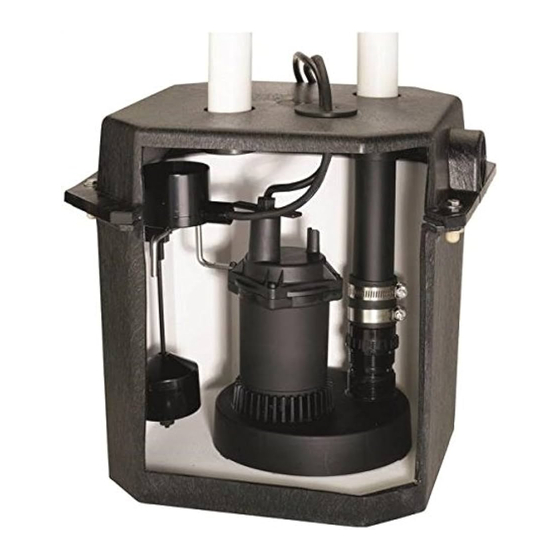
Publicidad
Idiomas disponibles
Idiomas disponibles
Enlaces rápidos
INSTALLATION
(See Figure 1)
A. Install the check valve on the pump base; stretch the hose
over the second step of the check valve. Slip two clamps
over one hose and slip the 7" length of discharge pipe into
this hose; tighten the clamps. Slide the second hose down
the opposite end of the discharge pipe until the pipe is
halfway through the hose.
B. Turn the water box cover upside down and install the gas-
ket around the edge of the flange, cleat side up. Insert the
capscrews up through the holes in the flange and gasket.
C. Set the pump in one corner of the water box as shown. Be
sure the float switch is unobstructed and free to move.
D. Turn the cover right side up and run the cords through the
non-threaded hole in the cover as shown.
E. Put the cover on the water box, making sure that the sec-
ond hose on the end of the discharge pipe from the pump
locks into the 1-1/2" NPT port in the cover that is closest
to a corner. The pump should not move in the water box
when you do this.
F. Secure the cover with the 8 capscrews and washers.
Compress the gasket material; do not overtighten. The
cleats on the corners of the gasket should hook over the
edge of the water box flange; if you catch the cleats
between the box and the cover, the box will leak.
G. Gently pull the slack out of the electrical cords. Slip the
grommet over the cords and slide it down the cords. Press
the grommet into the hole in the cover (lip up).
H. Install the inlet pipe in the opening as shown. Use RTV
sealant or Plasto-Joint Stik to seal threads. See Figures 2,
3 and 4 for typical installation arrangements.
I. Thread the end of the exterior discharge pipe down into
the 1-1/2" NPT hole in the cover that has the discharge
from the pump in it. You should install a union to allow
easy removal for service.
J. Thread a 1-1/2" NPT exterior vent pipe into the second
hole in the water box cover. Connect the vent pipe to the
sewer vent system. You should install a union to allow
easy removal for service.
K. Test the system by filling the water box with water and
running the pump through one complete cycle.
Risk of electrical shock. Do not handle
pump or pump motor with wet hands. If basement floor
is wet, do not walk on wet area until all power is turned
off. If shut-off box is in basement, call the electric com-
pany to shut off service to the house, or call your local
fire department for instructions. Remove pump and
repair or replace. Failure to follow this warning can
result in fatal electrical shock.
Always electrically ground pump motor to a suitable
electrical ground such as a grounded water pipe or a
properly grounded metallic raceway system, or to a
ground wire system.
Do not cut round grounding prong off of plug.
Unplug pump before attempting to service or remove
any component.
Install according to local and national electrical codes.
NOTICE: Laundry Tray Pump System part numbers (P/N)
are listed on the illustration. Refer to these numbers when
ordering parts. Refer also to the Pump Owner's Manual for
additional information.
Do not use in explosive atmospheres.
Pump water only with this pump. Failure to follow this
warning can result in personal injury and/or property
damage.
Laundry Tray Pump System
INSTALLATION INSTRUCTIONS
Install unions in discharge
and vent pipes for easier
service access.
Dimensions:
15-1/8" (384 mm) Square
13-3/4" (349 mm) High
Cover Flange
Capscrew
Cleat
Gasket
Drainer Pump
(P/N S1800V-03)
Water Box
Flange
Water Box with
Cover & Gasket
(P/N PS51-1P)
Stretch hose (provided) over
second step of check valve.
Figure 1 – Laundry Tray Pump System diagram.
Discharge
Vent
Pump
To prevent lint in the washing machine's
discharge from clogging the pump and causing a flood,
cover the end of the discharge hose with a nylon stock-
ing or a filter.
Discharge
Vent
Pump
Figure 3 – Typical installation
to remove air conditioner con-
densate or humidifier water.
Cord Grommet
Cover
Inlet
2nd Hose
7" Discharge Pipe
(P/N U37-687P)
1st Hose
Check Valve
(P/N RP0026-6)
4720 1004
5198 1105
Figure 2 – Typical
installation for
laundry sinks and
washing machines.
Discharge
Vent
Pump
Figure 4 – Typical wet
bar installation.
PS80-29 (Rev. 11/21/05)
Publicidad

Resumen de contenidos para Flotec FPZS33LTS
- Página 1 Laundry Tray Pump System INSTALLATION INSTRUCTIONS INSTALLATION (See Figure 1) Install unions in discharge and vent pipes for easier A. Install the check valve on the pump base; stretch the hose service access. over the second step of the check valve. Slip two clamps over one hose and slip the 7"...
- Página 2 Syst` e me de pompe de bac de buanderie INSTRUCTIONS D’INSTALLATION INSTALLATION (voir la Figure 1) Brancher un raccord union Install unions in discharge sur le tuyau de refoulement A. Brancher le clapet antiretour sur le socle de la pompe. Glisser le and vent pipes for easier tuyau souple par-dessus la deuxième saillie du clapet antiretour.
- Página 3 Sistema de bomba para tinade lavar INSTRUCCIONES DE INSTALACION INSTALACION Instale las uniones en los tubos de descarga y de (Vea la Figura 1) Install unions in discharge ventilación para facilitar el and vent pipes for easier A. Instale la válvula de retención en la base de la bomba; estire la Ventilación acceso para reparaciones service access.




